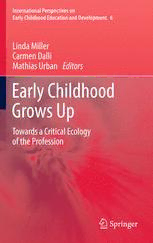
Early Childhood Grows Up: Towards a Critical Ecology of the Profession PDF
Preview Early Childhood Grows Up: Towards a Critical Ecology of the Profession
Early Childhood Grows Up International Perspectives on Early Childhood Education and Development Volume 6 SeriesEditors ProfessorMarilynFleer,MonashUniversity,Australia ProfessorIngridPramling-Samuelsson,GothenburgUniversity,Sweden EditorialBoard ProfessorJaneBone,UniversityofAuckland,Australia ProfessorYukikoMatsukawa,ChubuUniversity,Japan ProfessorRebecaMejíaArauz,ITESO,Mexico ProfessorNirmalaRao,UniversityofHongKong,China ProfessorAnneB.Smith,FormerlyfromtheChildren’sIssuesCentre,UniversityofOtago, NewZealand ProfessorColletteTayler,UniversityofMelbourne,Australia ProfessorEvaJohansson,UniversityofStavanger,Norway ProfessorLilianG.Katz,Ph.D.ProfessorEmeritaofEarlyChildhoodEducation,University ofIllinois,USA Earlychildhoodeducationinmanycountrieshasbeenbuiltuponastrongtraditionofamateriallyrich andactiveplay-basedpedagogyandenvironment.Yetwhathasbecomevisiblewithintheprofession,is, essentiallyaWesternviewofchildhood,preschooleducationandschooleducation. Itistimelythataseriesofbooksbepublishedwhichpresentabroaderviewofearlychildhoodeducation. Thisseriesseekstoprovideaninternationalperspectiveonearlychildhoodeducation.Inparticular,the bookspublishedinthisseries: • Examinehowlearningisorganizedacrossarangeofcultures,particularlyindigenouscommunities • Make visible a range of ways in which early childhood pedagogy is framed and enacted across countries,includingthemajoritypoorcountries • Critiquehowparticularformsofknowledgeareconstructedincurriculumwithinandacrosscountries • Explorepolicyimperativeswhichshapeandhaveshapedhowearlychildhoodeducationisenacted acrosscountries • Examinehowearlychildhoodeducationisresearchedlocallyandglobally • Examine the theoretical informants driving pedagogy and practice, and seek to find alternative perspectivesfromthosethatdominatemanyWesternheritagecountries • Critiqueassessmentpracticesandconsiderabroadersetofwaysofmeasuringchildren’slearning • Examine concept formation from within the context of country-specific pedagogy and learning outcomes Theseriescoverstheoreticalworks,evidence-basedpedagogicalresearch,andinternationalresearch studies.Theseriesalsocoversabroadrangeofcountries,includingmajoritypoorcountries.Classical areas of interest, such as play, the images of childhood, and family studies, will also be examined. However,thefocusiscriticalandinternational(notWestern-centric). · · Linda Miller Carmen Dalli Mathias Urban Editors Early Childhood Grows Up Towards a Critical Ecology of the Profession Foreword by Peter Moss 123 Editors Prof.LindaMiller Prof.CarmenDalli NorthEnd120 InstituteforEarlyChildhoodStudies SG85NZRoyston,Herts VictoriaUniversityofWellington Bassingbourn POBox600 UnitedKingdom Wellington6140 [email protected] NewZealand [email protected] Dr.MathiasUrban CassSchoolofEducationandCommunities UniversityofEastLondon WaterLane E154LZLondon UnitedKingdom [email protected] ISBN978-94-007-2717-5 e-ISBN978-94-007-2718-2 DOI10.1007/978-94-007-2718-2 SpringerDordrechtHeidelbergLondonNewYork LibraryofCongressControlNumber:2011942268 ©SpringerScience+BusinessMediaB.V.2012 Nopartofthisworkmaybereproduced,storedinaretrievalsystem,ortransmittedinanyformorby anymeans,electronic,mechanical,photocopying,microfilming,recordingorotherwise,withoutwritten permissionfromthePublisher,withtheexceptionofanymaterialsuppliedspecificallyforthepurpose ofbeingenteredandexecutedonacomputersystem,forexclusiveusebythepurchaserofthework. Printedonacid-freepaper SpringerispartofSpringerScience+BusinessMedia(www.springer.com) Foreword Early childhood education and care may be on the up at present, attracting the favourable attention of national and international policy makers and politicians, identifiedasa‘good’sectorofthewelfarestatedeservingofexpansionandinvest- ment. Yet it seems to me that its apparent healthy exterior hides many of the prevailing ills of our time, which, if ignored, may make the current attention somethingofamixedblessing.WhatillsdoImean? Firstisthetechnoscience,whichasEdgarMorinputsit, hasinvadedeverytissueofthedevelopedsocieties,implantingatanorganisationallevel the logic of the artificial machine. This logic has penetrated the sphere of daily life and repressedthedemocraticpowerofcitizensinfavouroftheexpertsandspecialists(Morin& Kern,1999,p.68). Thislogicoftheartificialmachineisfragmented,compartmentalised,reduction- ist; it is taken up with efficiency, predictability, calculability and specialisation; it avoidsorseekstocontrolcontextandcomplexity;anditcedesourresponsibility. Thesecondillistheprimacygiventoanextremeinstrumentalrationality,‘pre- occupied with calculation and quantification, with the relationship between inputs andoutputs,withfindingthemosteconomicalapplicationofmeanstoagivenend’ (Taylor,1995).ItisaprimeexampleofwhatLyotard(1984)terms‘performativity’, whichStephenBalldefinesas‘adisciplinarysystemofjudgements,classifications andtargetstowardswhichschoolsandteachersmuststriveandthroughwhichthey are evaluated’ (1998, p. 190). This instrumental rationality is focused intently on definingandimplementinganunwaveringrelationshipbetweenprescribedpractices andprocedures(oftengiventheshorthandof‘quality’)andprescribedoutcomes(for example,learningordevelopmentalgoals).Process,everydaylife,theunexpected, whichaccountforsomuchoflifeandmakelifesooftenworthliving,havenoplace here. The third ill, expressed in the words of historian Carlo Ginzburg (1998), is ‘constantly being offered solutions before we have asked the critical questions’. Putting technical practice first, obsessed by the technical question ‘what works?’, and assuming we can contract questions and answers to experts and specialists, education is drained of its essential political and ethical dimensions, dimensions thatareneededtofirstgeneratethenbegintofindanswerstokeycriticalquestions. v vi Foreword Questionssuchas:Whatisourimageofthechild?Oftheeducatorandpreschool? Howdoweunderstandconceptssuchaseducation,care,learningandknowledge? Whatisthepurposeofeducation?Whatarefundamentalvaluesofeducation?What dowewantforourchildren,hereandnowandinthefuture? Fourth, there is the ascendency of economistic thinking in an age of resurgent neo-liberalism.Thisresurgencehasbroughtaboutaone-dimensionalwayofthink- ing,withthecollapseofthesocialintoanoverwhelmingeconomicsphere,aprocess vividlydescribedbyNikolasRose: Social government must be restructured in the name of an economic logic... (and) the relationofthesocialandeconomicisrethought.Allaspectsofsocialbehaviourarenow reconceptualisedalongeconomiclines–ascalculativeactionsundertakenthroughtheuni- versalhumanfacultyofchoice.Choiceistobeseenasdependentuponarelativeassessment of costsandbenefitsof ‘investments’inthelightof environmental contingencies(Rose, 1999,pp.141–142). Economisticthinkinginearlychildhoodeducationtakestwomainforms.First, the reduction of early childhood education to a simple matter of economic invest- ment, justified in terms of delivering a certain level of economic return, typified by the oft quoted (and in my view dubious) claims that a dollar invested in early childhood education giving returns of $6 upwards. Second, the commodification, privatisation and marketisation of earlychildhood education: Inthisway of think- ing, early childhood education becomes a tradable commodity to be provided by businessescompetinginthemarketplace.Theparentisacustomer,engagedinan act of private consumption, an autonomous subject (‘autonomous’ understood as meaning independent of others, a separate entity with complete control over per- sonal decisions) responsible for managing her own risks, in this case purchasing careandeducationtomeettheneedsofherselfandherchild,butatthesametime relievedofresponsibilityforothersbeyondherimmediatefamily.Thechildisthe objectoftheservice,tobecaredfor,perhaps tobeeducated,thepassiverecipient oftheservicepurchasedbyhisorherparents. Ofcourse,thisisaselectionofcurrentills,therearemanytochoosefrom,and thereismuchinter-connectednessandoverlap.ButIthinktheygiveaflavourofmy thinking;asthingsaregoingweareindangerofgoverningchildrenmore,relying onearlychildhoodtofixthedeepstructuralproblemsinoursocieties,andimposing standardisationattheexpense ofpluralityandcriticalself-awareness.If,asMorin suggests,thechallengefacingourendangeredspeciesandravagedplanetistothink incontextandthinkcomplexity,thewaymuchearlychildhoodeducationandcare isgoingtodaywillnotpassmuster. Equallydisturbing,importantrelationshipsarebadlyoutofkilterandearlychild- hood education is caught up in this wider process too: the relationship between mankindandtheenvironment;betweenprosperityandwell-being;betweencoher- enceanddiversity;andbetweenpoetryandprose.AnothercuefromEdgarMorin: Humanlife,heargues,isamixtureofproseandpoetry,bothnecessary,bothwoven together,theprosesideencompassingwork,survivalandaimingattargets,themain siteforthepractical,utilitarianandtechnical;whilepoetryisawayoflifeinvolving participation,love,eagernessandjoy.Buttodaytherelationshipbetweenthetwois Foreword vii quite unbalanced. Having separated prose and poetry, modern western civilisation hasrelegatedpoetrytoprivatelife.Weneedapowerfulcounter-offensiveofpoetry, and not least in education, at a time when human beings spend most of their lives surviving and where the future on offer seems to be ever more prose as we look forwardtomoreyearsofpaidworkinanevermorecompetitiveeconomywherethe constantcryofthemanagerismoreproductivityandtheconstantcryofgovernment andbusinessistocompetebetterandconsumemore(seealsoVeaVecchi,2010,for adiscussionoftheplaceof‘poeticlanguages’inearlychildhoodeducation). ItisinthissomewhatdismalcontextthatIwelcomethisbook,asanothersignof agrowingmovementofresistanceanddiversity.Withitscross-nationalperspective, it makes us think of context and diversity, that perhaps not everywhere and every- onehasthesamevalues,goals,traditionsandconcepts–thoughsomeofthatrich diversity may be lost by having to work in the modern lingua franca of English, notthefirstlanguageofsevencontributors.Weareledtothinktooaboutdifferent images and understandings of the child, the centre and the pedagogical work that takesplaceinit. Thebook’sfocusontheeveryday–relatingasitdoestosomeoftheworkdone byaninternationalteamofresearcherscollaboratingonaprojecttitledADayinthe LifeofanEarlyYearsPractitioner–leadsustothinkaboutprocessandthemeaning oflivingpartofone’slife,whetherchildoradult,inearlychildhoodcentres.Itraises thecriticalquestionbehindmycolleagueAlisonClark’sMosaicapproach(Clark& Moss,2001)tolisteningtoyoungchildren,‘whatdoesitmeantobeinthisplace?’ It acknowledges, too, the irreducible element of uncertainty when working with childrenandadults(andnotjustinnurseriesonemightadd),remindingusthatthe concept of outcomes may have some use only if it allows for the surprising and unexpected,notjustthepredefinedandnormative. The book delves into critical questions about pedagogy, relationships and pro- fessionalism. And the inclusion in one chapter of the term ‘new public education’ encouragesustocontestthedominanceofprivatisationandmarketisation,the‘new privateeducation’,andtoopenupforthinkingwhatanewpubliceducationmight meanandwhatitmightofferourstrained,fracturedandunjustsocieties.Oneele- mentofthat‘newpubliceducation’,forme,wouldbethevaluingofcollectiveover individualchoiceinmanykeyareas,thusbringingdemocracyintothenurseryasa foundationalvalueandpractice. Ihavebeencriticalofthetechnical,themanagerial,theeconomic.Eachthough has its place, but it is a sign of a democratic, flourishing and just society that that placeisdebatedandthatthetechnical,themanagerialandtheeconomicareputat theserviceofricherandmoreimportantpurposes–inthebackseat,notthedriving seat,toolsatthedisposaloftheworkforce nottheother way round. Whichbrings metoafinalobservation:Thegrowingattentiongiventoearlychildhoodeducation andcareisbringingawelcomeattentionalsototheworkforceintheseservices,and not before time given the low levels of education and often disgracefully low pay deemedsufficientformanymembersofthisworkforce,inparticularforthosework- ingwithchildrenunder3yearsandinso-calledchildcareservices.But–despitethis attentionandthehigherlevelsofinitialandcontinuingeducationitisgivingsome viii Foreword rise to – unless the technical, the managerial and the economic are reined in, and unlessmorespaceismadeforthediscussionofprofessionalisation,wemayendup havingachievedonlyatransitionfromtheworkerassubstitutemothertotheworker aslowerorhighergradetechnician.Ihopethisbookcontributesbothtothespace neededforthatdiscussionandtothediscussionsthattakeplaceinthatspace. London,UK PeterMoss* References Ball,S.J.(1998).Performativityandfragmentationin‘postmodernschooling’.InJ.Carter(Ed.), Postmodernityandthefragmentationofwelfare(pp.187–203).London:Routledge. Clark,A.,&Moss,P.(2001).Listeningtoyoungchildren:TheMosaicapproach.London:National Children’sBureau. Ginzburg,C.(1998).Ledtrådar:Essäeromkonst,förbjudenkunskapochdoldhistoria(Threads. Essaysonart,forbiddenknowledgeandhiddenhistory).Stockholm:HäftenforKritiskaStudier. Lyotard, J.-F. (1984). The postmodern condition: A report on knowledge. Minneapolis, MN: UniversityofMinnesotaPress. Morin,E.,&Kern,A.B.(1999).Homelandearth:Amanifestoforthenewmillennium.Cresskill, NJ:HamptonPress. Rose, N. (1999). Powers of freedom: Reframing political thought. Cambridge, UK: Cambridge UniversityPress. Taylor,C.(1995).Philosophicalarguments.Cambridge,MA:HarvardUniversityPress. Vecchi,V.(2010).ArtandcreativityinReggioEmilia:Exploringtheroleandpotentialofateliers inearlychildhoodeducation.London:Routledge. *PeterMossisProfessorofEarlyChildhoodProvisionattheInstituteofEducation,University of London. His academic interests include services for children and their workforces, the rela- tionshipbetweencare,employmentandgender,democracyineducation,andsocialpedagogy.He coordinatesaninternationalnetworkonparentalleavepolicyandresearch. Acknowledgements Thisbookhasbeenanexcitingandstimulatingprojectthathaspulledtogetherthe work of colleagues spread across the globe. We thank each contributor for their enthusiasm,hardworkandcollegiality. In particular, we would like to acknowledge the contribution of the six early childhoodpractitionerswhosharedtheirperspectivesandexperienceswithus,put up with our cameras and questions, and provided the basis for what has become a fascinatingexampleof‘practice-basedevidence’fortheday-to-dayecologyofthe early childhood profession. Without Anna (Sweden), Bette (New Zealand), Josie (Australia),Julie(England),Maija(Finland)andFrauMüller(Germany)thisbook wouldnothavebeenpossible. OurthanksgototheEuropeanEarlyChildhoodEducationResearchAssociation (EECERA)atwhoseannualconferencesthisbookwasconceived. Finally,wethankSusanKaiserattheJessieHetheringtonCentreforEducational Research at Victoria University of Wellington, New Zealand, for her invaluable assistanceinputtingthemanuscripttogether.Withoutherimpeccableeyefordetail, andherunfailinggoodhumour,ourroleaseditorswouldhavebeenmuchharder. LindaMiller CarmenDalli MathiasUrban ix
